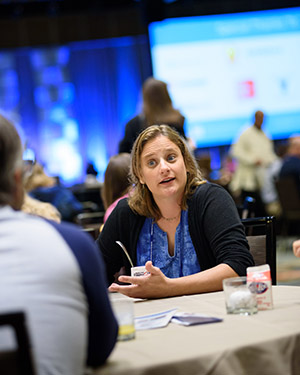Conference Connections
I once heard that fall is “conference season.” At the time it didn’t mean anything to me, but for some reason it stuck in my head. This past year I got a taste of what this means. By happenstance, I had the opportunity to attend two conferences back to back in October: the OLC International Conference and UPCEA Central Region Conference.

OLC is huge. There’s no doubt about it. This is both good and bad. It’s good that there are a lot of high-quality sessions to choose from, and it’s good that there are a lot of people to connect with. On the other hand, it’s so large that one’s ability to absorb knowledge is compromised by the din of all the activity, especially when poster sessions are held in the exhibit hall, as they were at OLC.
The focus of the conference is online learning. The UPCEA regional conference was small and intimate with a broader focus of strategies for continuing and higher education institutions. It was special because it was local and celebrated the 100th anniversary of the first UPCEA conference, which was also held in Madison, WI.
So, why am I writing about these conferences today? From these two very different events, I was reminded of a couple important things. First of all, as professionals working in an academic environment, we (IDs, faculty, and administrators) have a lot to gain from being pushed and questioned by others. For example, I gave a presentation at OLC about best practices for using OERs. It was well-received and those in attendance seemed to appreciate the approach I shared. Then, one of the participants asked me about how our organization shares OERs! Such a simple question, but it surprised me. With respect to the project I was presenting on, our organization wasn’t in a position to make any OERs that could be shared. But the question made me think about other projects within the organization where there might be more potential for sharing under creative commons licensing, and set me on a path to explore the idea of contributing more to the OER community. Ultimately, I was grateful that the question was asked because it helped refocus my own thinking.
The second reminder for me was that networking works. On my way out of the presentation room, I had a conversation with the woman who asked the question above about sharing. We discussed how her institution has embraced OER making, sharing, and using. After a different session, I connected with an instructional designer and had a meaty conversation about building a new competency-based program. We discussed our common hurdles and strategies for tackling them. Both conversations were invigorating, but we all know how easy it is for ideas and enthusiasm to fade after any conference is over. I didn’t want those connections I made to be fleeting. This motivation is one of the main reasons why I’m here writing.
In an effort to build something lasting from these conference encounters and other professional connections I’ve made over the years, I will dedicate future posts to making colleague connections. Stay tuned as I explore topics like openness policies, faculty support, and instructional designer development with others in the field.